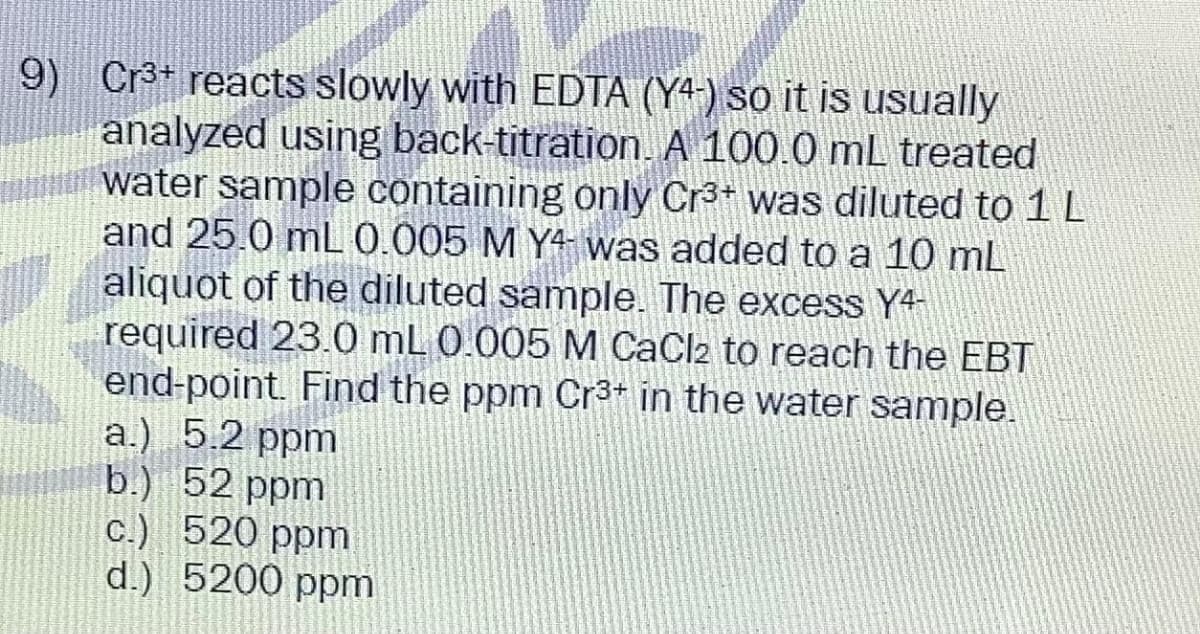9) Cr³+ reacts slowly with EDTA (Y4-) so it is usually analyzed using back-titration. A 100.0 mL treated water sample containing only Cr³+ was diluted to 1 L and 25.0 mL 0.005 M Y4- was added to a 10 mL aliquot of the diluted sample. The excess Y4- required 23.0 mL 0.005 M CaCl2 to reach the EBT end-point. Find the ppm Cr³+ in the water sample. a.) 5.2 ppm b.) 52 ppm c.) 520 ppm d.) 5200 ppm
9) Cr³+ reacts slowly with EDTA (Y4-) so it is usually analyzed using back-titration. A 100.0 mL treated water sample containing only Cr³+ was diluted to 1 L and 25.0 mL 0.005 M Y4- was added to a 10 mL aliquot of the diluted sample. The excess Y4- required 23.0 mL 0.005 M CaCl2 to reach the EBT end-point. Find the ppm Cr³+ in the water sample. a.) 5.2 ppm b.) 52 ppm c.) 520 ppm d.) 5200 ppm
Principles of Instrumental Analysis
7th Edition
ISBN:9781305577213
Author:Douglas A. Skoog, F. James Holler, Stanley R. Crouch
Publisher:Douglas A. Skoog, F. James Holler, Stanley R. Crouch
Chapter14: Applications Of Ultraviolet-visible Molecular Absorption Spectrometry
Section: Chapter Questions
Problem 14.6QAP: The accompanying data (1.00-cm cells) were obtained for the spectrophotometric titration 10.00 mL of...
Related questions
Question
C is the answer. Show solution and explanation COMPLETELY,

Transcribed Image Text:9) Cr³+ reacts slowly with EDTA (Y4) so it is usually
analyzed using back-titration. A 100.0 mL treated
water sample containing only Cr³+ was diluted to 1 L
and 25.0 mL 0.005 M Y4 was added to a 10 mL
aliquot of the diluted sample. The excess Y4-
required 23.0 mL 0.005 M CaCl2 to reach the EBT
end-point. Find the ppm Cr³+ in the water sample.
a.) 5.2 ppm
b.) 52 ppm
c.) 520 ppm
d.) 5200 ppm
Expert Solution
This question has been solved!
Explore an expertly crafted, step-by-step solution for a thorough understanding of key concepts.
Step by step
Solved in 4 steps

Knowledge Booster
Learn more about
Need a deep-dive on the concept behind this application? Look no further. Learn more about this topic, chemistry and related others by exploring similar questions and additional content below.Recommended textbooks for you

Principles of Instrumental Analysis
Chemistry
ISBN:
9781305577213
Author:
Douglas A. Skoog, F. James Holler, Stanley R. Crouch
Publisher:
Cengage Learning

Principles of Instrumental Analysis
Chemistry
ISBN:
9781305577213
Author:
Douglas A. Skoog, F. James Holler, Stanley R. Crouch
Publisher:
Cengage Learning